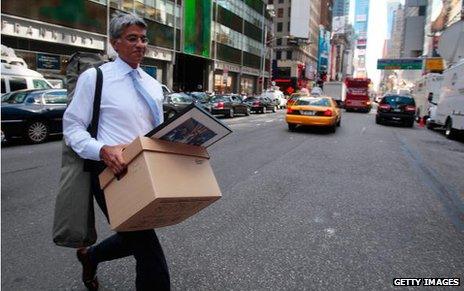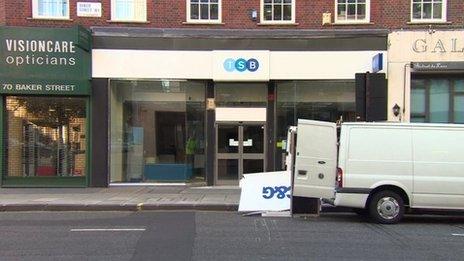Five years after Lehman, all tickety-boo?
- Published
- comments

Lehman employees worldwide found themselves out of work
At the end of this week, on 15 September, it will be the fifth anniversary of the collapse of the US investment bank Lehman Brothers.
This momentous event feels almost unreal to me now. At the time, global markets were in turmoil and I was working all hours of the day and night, seven days a week, in an attempt to make sense of what was going on.
But although this is history, it's important to recognise that Lehman's brutal demise was the trigger of the great crash and worst global recession for well over 60 years. But it was not the cause.
Think of Lehman as a heart attack afflicting a body - the financial system - whose arteries were clogged and which was carrying dangerous amounts of flab as a result of reckless living over many years.
If it had simply been a case of a single bank pushing the boat out too far, there would not have needed to be unbelievably expensive taxpayer-financed bailouts of banks and financial institutions all over the world, from RBS and Lloyds/HBOS in the UK, to UBS in Switzerland, and Bank of America, Citigroup and AIG in the US, among many others.
The question is whether the financial system is now in shape, and capable of absorbing the inevitable knocks and bruises to which all constructs of frail humans are prone, without inflicting too much cost on the rest of the economy or taxpayers.
What has been done in five years to prevent banks holding entire economies to ransom when they run into difficulties?
Well, there has been a good deal of reform and rehabilitation - though it is a long way from being finished.
The first thing to note is that the thrust of reform has been to sanitize the existing system, not to impose fundamental structural change on it.
Individual banks have sold loss-making or peripheral assets, unwound some of the more toxic assets and adopted a more prudent approach to lending (and in the process of mending themselves, staunched the supply of new credit, thus holding back the recovery of many economies, including our own).
But many banks are still enormous, especially in the UK. They have not been forcibly broken up or dismantled; they remain too big to fail, in the jargon. Right now, if one of the biggies found itself in dire straits again, taxpayers would ride to the rescue once more, for fear of the havoc to the economy that chaotic failure would wreak.
Of course, if you are one of the five million customers of Lloyds who are today becoming customers of TSB, as Lloyds meets the obligation placed on it by the European Commission to spin off 630 branches into a new bank, you probably think the big banks are shrinking.

The TSB name is reappearing on the High Street after 18 years
But what Lloyds is being forced to sell represents only a sixth of its network, and a much smaller proportion of its assets and liabilities.
And, anyway, Lloyds isn't one of the very biggest banks. Barclays, HSBC and RBS are much bigger. Their individual balance sheets remain larger than the UK's annual economic output, which raises the legitimate fear that they they are too big to save (rather than too big to fail), for an over-stretched British public sector.
The other important respect in which there has not been root-and-branch change is that the international rules, called the Basel rules, for ensuring that banks hold enough capital, to absorb losses without eating into depositors' precious savings, have been amended but not scrapped.
The point is that part of what went appallingly wrong in the boom years before 2007/8 is that banks cynically exploited these rules - especially the so-called risk-weightings attached to different categories of loan - to hold as little capital as possible.
The effect of this gaming of the Basel rules is that the likes of Northern Rock and Royal Bank of Scotland appeared to have more than enough capital to cope with whatever accidents might come their way, when in fact they had only the tiniest sliver of such protection for their depositors.
There is an argument that after Lehman, the Basel rules should have been torn up, and replaced with much simpler rules - which could be more effectively policed and monitored by regulators and shareholders. That did not happen.
In practice, the rules have become much more complicated.
It is true that risk-weightings have been or are being amended to better reflect the perceived risks of different kinds of lending and financial trading; and banks are being instructed to hold more capital in relation to all categories of lending and investing.
But if anything the rules have become more complicated, which means that it is arguably even harder to see the underlying risks being taken by banks, and the opportunity for gaming the rules in future years has probably been elevated.
If sunlight is the best disinfectant, we should worry that banks still operate behind a glass darkly.
The final area where there has been sanitisation, not reconstruction, is in pay and rewards.
Without labouring the point, it is still possible for bankers to earn magnificent sums working for institutions still dependent on guarantees from the state, from taxpayers - which some would see as inappropriate.
However, those rewards will in theory at least be more closely dependent on the real longer-term performance of the relevant banks, rather than being the spoils of short-term illusory profits.
To put it another way, bankers' pay is still enormous, but the risk of ginormous bonuses being a reward for bankrupting the rest of us has been reduced.
None of which, I hope, is to create the impression that nothing important has been fixed since since Lehman. But I would characterise this as mending the status quo, rather than replacing it. Here is what has happened:
Banks have been forced to significantly increase the amount of capital they hold to absorb potential losses and to improve the quality of that capital (so that we can be more confident that the capital will do its job in a crisis). In the UK, for example, banks probably now hold twice as much loss-absorbing capital relative to their loans as they did in 2008 (although some experts, including the chairman of the influential Independent Commission on Banking, Sir John Vickers, argue that banks should be forced to double their capital again).
A backstop to the Basel risk-weighted capital adequacy requirement (stay awake) has been introduced with a leverage constraint - which forces banks to hold a certain amount of capital relative to their gross loans and investments, rather than their risk-weighted loans. If this sounds a bit technical and complicated, what you need to know is that this leverage rule will make it easier to see how much capital is in the system. That said, many would argue that the minimum ratio of capital to loans under this leverage constraint (just 3%) is far too low.
There are new rules to make sure banks hold more cash or equivalents of cash, so that they can meet surges in demand for repayment of what they've borrowed from depositors and creditors without sparking a panic.
Banks are being forced to more carefully and prudently match the maturity of what they borrow with the maturity of what they lend - so that they are less vulnerable to having no cash when their creditors want their money back.
In the US, UK and eurozone, in three different ways, steps are being taken to insulate retail banking from the perceived volatility of investment banking. In the UK, this is being done by putting retail banking behind a firewall or ring fence - the fruits of the Independent Commission on Banking set up by the chancellor.
On 3 October, a good deal of trading in derivatives, commodities. credit and currencies will be obliged to take place in what will look much more like central market-places, with guarantees against non-settlement provided by what are known as central counterparties. This is supposed to address two of the major flaws highlighted by the Lehman debacle, which is that regulators and investors could not see the risks Lehman was accumulating, nor how its woes could inflict damage on a series of other banks and investors.
There is also a good deal of work in progress. One of the more important projects is to prevent better regulation of the banks shunting all the risks of finance over to unregulated firms - so-called "shadow banks" - in a dangerous way.
To state the bloomin' obvious, there is no point making banks safer, if by doing so we have simply created a whole new species of financial weapons of mass wealth-destruction.
If, for example, the supply of loans to the economy came to a halt because a series of hedge funds, and peer-to-peer lenders, or other new-generation lenders went Pete Tong, we would not take much comfort from the fact that the culprits were not official banks.

DJ Pete Tong's name is rhyming slang for wrong
Also under review is how to "resolve" banks that get into difficulties at minimum cost to taxpayers.
This will involve making it easier to hive off and protect the parts of banks viewed as essential to the functioning of the economy (our deposits, the system for moving money around and the loan-making processes) and bailing-in rather than bailing-out.
If you are still with me (you are probably the only one) bailing-in is where losses are forced on professional investors who have lent to banks, as opposed to bailing out, where the rescue costs are heaped mainly on taxpayers.
That is why what is going on at the Co-op Bank is an incredibly important precedent. The attempt to rescue it involves arguably the UK's first bail-in, an initiative to dump £500m of losses on its bondholders rather than taxpayers.
You should now have a reasonable grasp of what has happened since the Lehman disaster to protect us the next time greed in finance gets the whip hand over judgement, prudence and probity.
Can we be entirely confident that there won't be another financial meltdown for at least a further 60 or 70 years, and that the costs of the next meltdown will be less catastrophic?
That is not obvious.
First, and which won't come as surprise to readers of this column, we continue to inhabit a world of biggish hazards - hazards from the potential shock of a pricking of the two big bubbles of more recent vintage, in government bonds (from quantitative easing) and in Chinese debt and property, and hazards from a eurozone banking system that remains fragile, and to which all other banks are connected.
Second, channelling much of the trading at investment banks through central exchanges and clearing systems is to replace a new risk for an old one. The pooling of trading may be to make the risks more visible, but it is also to concentrate those risks.
Just because exchanges, clearing and settlement systems have a history of failing less frequently than individual banks doesn't mean they can't ever fail. And nor does it mean they can't fail catastrophically.
If, as happened in the notorious "flash crash" of 2010, central markets in currencies and derivatives suddenly went haywire, we might begin to question whether the Lehman debacle was quite as bad as it can get.